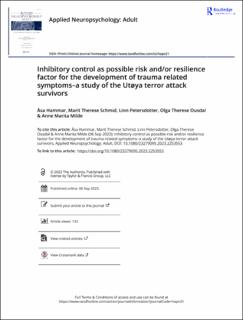Inhibitory control as possible risk and/or resilience factor for the development of trauma related symptoms–a study of the Utøya terror attack survivors
Hammar, Åsa Karin; Schmid, Marit Therese; Petersdotter, Linn; Ousdal, Olga Therese; Milde, Anne Marita
Journal article, Peer reviewed
Published version

Åpne
Permanent lenke
https://hdl.handle.net/11250/3091384Utgivelsesdato
2023Metadata
Vis full innførselSamlinger
Sammendrag
PTSD symptomatology is known to be associated with executive dysfunction. Inhibitory control is a core component of executive functioning, and inhibitory skills are essential both for adequate functioning in everyday life and important in situations following trauma. The aim of the present study was to examine the relationship between trauma exposure, inhibitory control and PTSD symptomatology in adolescent survivors of the terror attack at Utøya, Norway on the 22nd of July, 2011. In this cross-sectional case-control study, 20 trauma exposed adolescents and 20 healthy controls matched in age and gender were compared on a neuropsychological test of cognitive inhibition (Color-Word Interference Test) and a self-report measure of inhibition ability (BRIEF-A). Our analyses revealed that the trauma exposed group differed significantly on the self-reported measure of inhibitory control compared to the control group, but there were no differences between groups on the objective measures of cognitive inhibition. Follow-up analyses with subgroups in the trauma exposed group based on PTSD symptomatology (PTSD + and PTSD-) and the control group revealed that the PTSD- group showed significantly better results than both the PTSD + and the control group on the measures of inhibitory control. Moreover, the follow-up analyses showed that the PTSD + group showed significantly poorer results from the other two groups on the measures of inhibitory control and self-reported inhibition. We conclude that impaired inhibitory control, measured both objectively and by self-reported questionnaire, is related to PTSD symptomatology. Findings suggest that inhibitory dysfunctions may be a vulnerability factor for the development of PTSD symptomatology in trauma exposed adolescents, and thus it seems that the ability to exhibit inhibitory control could be a possible resilience factor to prevent the development of PTSD symptoms.
